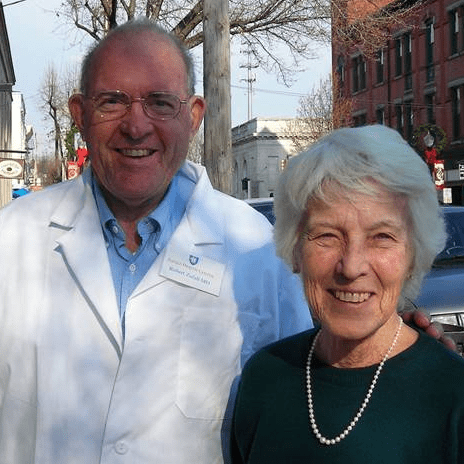

What Health Care Should Be Like: Zufall in the New York Times, 1992
In a world in which going to the doctor can be difficult or scary, especially for people with limited resources, Zufall Health has long represented what health care should be like: compassionate, community-oriented, and available to everyone.
Zufall started as a small, volunteer-powered clinic inside St. John’s Episcopal Church in Dover. Here, founders Robert Zufall, MD (“Dr. Bob”), and his wife, Kathryn (“Kay”) created a space where underserved people and families, many Spanish-speaking, could access medical care at an affordable cost and in a language they understood.
A 1992 New York Times story gives a closer look at the Zufalls’ early years leading the health center. Dr. Bob and Kay received early praise from the New Jersey Department of Health (NJDOH), who awarded them a significant grant to hire their first staff members and purchase medical equipment. One former NJDOH executive said, “You go into the clinic and it’s like a cloak of good will and friendliness is wrapped around you.”
The story also reveals why Dr. Bob and Kay formed their clinic. During the 1980s, the couple provided volunteer medical assistance and education in Honduras, Guatemala, and Peru, an experience that brought them great satisfaction. They later realized the need for similar services much closer to home, in Dover.
This look into Zufall’s history reminds us that health care needs to be more than doctors simply treating patients for a medical complaint. It must also be about showing kindness, building a strong community, and providing the same quality of services to everyone, no matter their circumstances. The full text of the NYT article is available here and below:
A Family Clinic That Tries to Be Both
By Kathleen Teltsch
June 15, 1992
Patients have to love the way Dr. Robert Zufall and his wife, Kathryn, shape the practice of family medicine to their needs: There are no intimidating questionnaires to complete. No appointments are needed. Best of all, there are no doctor’s bills from the Dover Free Clinic – only an inconspicuous box for contributions in bills or coins.
The doctor, who turned 68 this month, never seems hurried. Mrs. Zufall, an energetic 65-year-old, skillfully elicits needed information including such intimate details as how many people share a dwelling and who is a wage-earner. If a translator is needed for the largely Hispanic clientele, there is always someone around eager to help. Often it is Tania Roman, a winsome 13-year-old who comes after school, or Sandra Camayo, who arrived as a patient but then become one of the dozens of unpaid staff members who help the Zufalls.
In fact, virtually the entire operation is run by volunteer doctors, nurses and counselors, which is why Dr. Zufall can say cheerfully, “We’re the cheapest thing around.” The clinic gets free space in the parish house of St. John’s Episcopal Church.
New Jersey’s Department of Health selected the Zufalls’ clinic and six others as experimental models set up to give easier access to health care for the 900,000 to 1 million state residents who cannot afford a personal physician and lack health insurance. Many are recent Hispanic immigrants. If a model works, the plan is to copy it across the state.
The Dover Free Clinic has already proved to be special, says Nancy Featherstone, executive director of health policy and research for the Health Department. “You go into the clinic and it’s like a cloak of good will and friendliness is wrapped around you,” she said.
On a professional level, she approves of the way the Zufalls have created a groundswell of volunteers to help them and developed a smooth collaboration with Dover General Hospital. The clinic will receive $97,500 annually from the state. The grant will allow the Zufalls to hire Maria Zimmerman as a full-time nurse, pay a part-time social worker and buy some equipment for the clinic, which uses a former pantry as its examining room.
Alex Hultado had a dimpled smile for all when he came through the door recently to meet Dr. Zufall and Mrs. Zimmerman. But when the 4-year-old’s arm was swabbed, and suddenly realizing an injection was coming, he let out a piercing shriek, scrambled under a chair and turned into a squirming, kicking centipede. The deed was finally done.
”I bet I could have done it without having to get on my knees,” observed Dr. Gary Eddey, a pediatrician, who helps out two days each month and arrived as a teary Alex was led away, consoled with butterscotch. Which is as close to criticism or competition as anyone seems to get.
Dover General Hospital welcomes the clinic’s success in attracting patients, said Sue Cunningham, vice president for nursing, who drops by regularly. She is working on videotapes to demonstrate baby care and parents’ skills, which will be shown in the clinic waiting room.
The Zufalls say they are Hispanic only by adoption. After their five children were grown — one daughter is a doctor in Seattle — the couple began traveling to South America to help CARE, the agency, provide medical assistance.
They visited Honduras, Guatemala and Peru in the 80s. During one trip, Dr. Zufall taught surgery and his wife, who has a graduate education degree, taught English. Two years ago, they began casting about for some way to continue to be useful but closer to home. The clinic is the venture for the 90’s, they say. Mrs. Zufall added, “We don’t play golf; this is fun.”
The couple came to Dover 38 years ago. He still practices urology in Mountain Lakes nearby and still serves on the Dover Hospital staff.
St. John’s invitation to the Zufalls was in keeping with the church’s tradition of hospitality to groups that help Dover’s low-income population, said the Rev. Dwight L. Neglia, its rector. “Many residents have lost jobs and we can see one outcome: our church thrift shop is thriving,” he said. Giving space to the clinic is a way of returning something to the community.”


